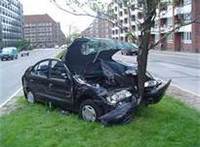Teen Driving Deaths on the Rise; Parents Can Help Reverse Trend
 |
DEARBORN, MI , March 18, 2013 :
- Parents play a key role in teens' decisions on safe driving. Research for Ford's Driving Skills for Life program (DSFL) shows teens tend to emulate how their parents drive.
- Traffic fatalities are the leading cause of death for American teens. There were more than 3,000 teen fatalities in 2010, according to the National Highway Traffic Safety Administration (NHTSA).
- In 2013, Ford Driving Skills for Life will reach about 200 high schools with its safe driving materials, thanks to Ford Motor Company Fund and the Governors Highway Safety Association (GHSA).
Traffic fatalities are the leading cause of death for American teens. In recent weeks, a number of crashes involving teen drivers have led to more than a dozen teenagers tragically losing their lives. And a recent report by the Governors Highway Safety Association (GHSA) shows that teen driver fatalities are on the rise among 16-17-year-old drivers.
Parents can help reverse that trend. Research done for Ford's Driving Skills for Life (DSFL) program shows teens tend to emulate how their parents drive. In fact, more than three quarters of teens and tweens surveyed say they rely heavily on their parents' advice when they start to drive.
"By setting a good example behind the wheel, parents can increase the chances their children will adopt safe driving practices," said Jim Vella, president, Ford Motor Company Fund and Community Services. "While state laws and educational programs are critical, ultimately, parents are the most critical component to keep their teen drivers safe."
Tips for parents
Experts from Ford Driving Skills for Life have tips on what parents
can do to help their teens be better drivers:
- Engage in the driving process -- As teens get closer to earning/acquiring their learner's permit, parents should actively engage with them about driving. Talk about safe driving behaviors, practice with them, seek educational opportunities, and be clear that unsafe actions won't be tolerated.
- Buckle up -- It's the law, and if parents don't wear their seat belts, their teen is more likely to do the same. In a crash, a person not buckled up is much more likely to be injured or killed than someone wearing a seat belt.
- Never speed -- Research done for Ford Driving Skills for Life shows that if parents speed, their teens are more likely to do the same. Excessive speed continues to be a factor in about one third of all traffic deaths nationally.
- Don't drive distracted -- By setting a tough "no distractions" rule for their teens and modeling this same behavior, parents send the message that distracted driving will not be tolerated.
- Don't follow too closely -- Parents should keep the proper distance from the car in front of them. Rear end collisions are common and preventable.
- Always scan ahead for hazards -- Parents should remind their teens to be aware of what is going on around them by scanning to the right and left as they drive.
- Limit the number of passengers -- Research shows young drivers can easily be distracted by just one additional passenger -- increasing the risk of a crash exponentially. Many graduated driver's license programs restrict the number of passengers as a condition of issuing an early license or permit; parents should enforce those restrictions.
- Never drink and drive -- Parents should remind teens that drinking and driving will not be tolerated.
Ford Driving Skills for Life
In 2013, Ford DSFL is doubling the number of students it reaches with
its hands on driving programs to 40,000. This includes visits to at least
40 high schools in Arizona, California, Illinois, Michigan, Oklahoma, Tennessee, Texas and Virginia with an array of activities focused on
common driving challenges faced by teen drivers. Teens will be able to
experience real-world driving situations in a controlled environment using
specially equipped vehicles. The hands-on clinics offer professional
drivers and activities that build skills in five key areas: driver
distraction, speed management, space management, vehicle handling and
hazard recognition.
In addition to the hands-on clinics, Ford Driving Skills for Life will reach an additional 150 high schools with its safe driving materials, Web-based learning, partnerships with state highway safety agencies, fun contests and free educational materials for parents and teachers.
You can find more information online at Driving Skills for Life .


